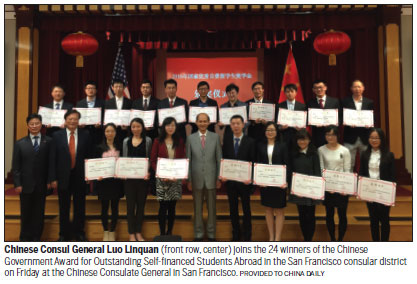Top students honored at consulate
Twenty-four outstanding Chinese students currently studying in the US were singled out for academic excellence in 2016 on Friday at the Chinese Consulate General in San Francisco.
The annual awards program is sponsored by the China Scholarship Council, a non-profit agency affiliated with the country's education ministry, aimed at providing financial assistance to overseas Chinese students.
In the San Francisco consular district, covering Alaska, Washington, Oregon, Northern California and Nevada, 24 Chinese students were each awarded certificates and $6,000 scholarships.
They were among 501 winners of the Government Award for Outstanding Self-financed Students Abroad, which was established in 2003 to reward the academic excellence of self-financed Chinese students studying abroad, as well as encourage them to return to China or contribute to China's development after graduation.
"Since China adopted the reform and opening-up policy, more and more Chinese students choose to pursue education abroad," said Chinese Consul General Luo Linquan, addressing the awards ceremony. "They have demonstrated their talent in various areas through their hard work."
Last year, a total of 544,500 students studied abroad, up 4 percent year on year, which makes China the country sending the largest number of students abroad, according to Luo.
Among those overseas students, nearly 80 percent are studying in English-speaking countries, including the US, the UK and Australia. The number of self-financed students reached 498,200, making up 91.49 percent of the total overseas Chinese students.
Yuan Gao, 30, is one of this year's award winners. He is a graduate student in biophysics at the University of California-San Francisco.
Gao studies three-dimensional structures of macromolecules in the human body using a technique called single-particle cryo-electron microscopy. Such research can help scientists better understand key physiological processes and eventually facilitate development of better therapeutic drugs, he said.
Last year, Gao also received an award from the Xinjiang Uygur autonomous region, his home area. The award was aimed at recognizing the achievements of native Xinjiang students studying overseas.
"What's more important than the financial sponsorship is the recognition of my work on the national level," said Gao.
He said the award represented the Chinese government's attention and care for overseas students and it would encourage him to make further academic strides.
After receiving his doctorate degree this summer, he said he plans to further his studies as a postdoctoral researcher in the US.
"Students' mobility is an important part of the educational exchanges between China and the United States," said Luo.
Currently, 328,000 Chinese students are studying in US universities, and 43,000 of them are in the San Francisco consular district, according to Luo.
"The exchange of students will promote better understanding and friendship between the two countries as well as a healthy bilateral relationship," he said.

























